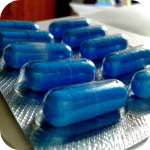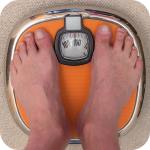Eating the wrong things can seriously damage a man’s fertility. They can reduce your sperm count, affect the sperm motility (the sperm’s ability to swim) and increase the number of abnormal misshaped sperm you produce. This alone can dramatically lengthen the time it takes you to get your partner pregnant and if your sperm quality is already reduced for other reasons, it can prevent you from having children naturally.
You are never going to be able to completely cut out all the foods to avoid when trying to conceive from your diet because with today’s global food market, you can never be quite sure where all your food has come from or how it was raised or produced.
However, there are some guidelines I can share with you that will help reduce the worst offenders from your diet and give your sperm the boost they need.

Soy
First on the list of foods to avoid when trying to conceive is soy because it is often portrayed as being healthy (and it might be, but not when you are trying to conceive).
Eating soy has been linked to a reduced sperm count, with one study showing sperm production almost halved for men on a high soy diet. Most researchers believe this is because of the high levels of isoflavones found in soy. These isoflavones are a phytoestrogen that mimics natural oestrogen, a hormone that has a known detrimental effect on male fertility in high quantities.
Soy is commonly found in: Tofu, Soymilk, Soy Sauce, Soybeans (not really a great surprise that one), Miso, Tempeh and Edamame

Non-Organic Fruit and Vegetables
Modern farming techniques can use a lot of pesticides; substances used to kill or repel animals, insects or plants that interfere with crop growing. Studies have shown that consumption of pesticides in high levels can cut sperm production by more than 50% and reduce the number of motile sperm by a similar amount.
You will never eliminate pesticides from your diet completely, but you can limit the amount you consume by buying organic fruit and vegetables. If you can’t find the organic versions of your favourite fruit and veg (or they are too expensive), buy the normal ones and make sure you thoroughly wash them so you can at least remove any pesticides that are on their outside.
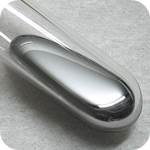
Fish Rich in Mercury
Mercury is the only metal that is liquid at room temperature. It is also very toxic and has been linked with infertility in both men and women.
Mercury from industrial pollution makes its way into the ocean where it enters the food chain. The doses in small fish are relatively low, but large predatory fish have much higher concentrations because they eat a lot of the small fish and the mercury builds up in their systems.
When trying for a baby, avoid eating swordfish, shark, tuna, yellowtail, tilefish (also known as blanquillo), sea bass, mackerel and cheap sushi.
NOTE: If you have an old mercury filled thermometer, these are now classed as a poison hazard. Place it in a suitable container to prevent breakage and dispose of it by taking it to a household hazardous waste collection centre (find your local centre by Googling “household hazardous waste collection” and your location).
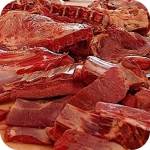
Non-Organic Meat
With some modern farming techniques, livestock are given hormones to stimulate growth. These hormones can disrupt your body’s normal hormonal balance, which in turn can cause a detrimental effect on your sperm production.
In addition, non-organic farms can feed their animals food which has been grown with pesticides and chemicals. These pesticides and chemicals build up in the animal’s body and are also bad for your sperm production.
Where possible, buy organic meat to limit your exposure to these hormones and chemicals. However, this can be very expensive (for example, organic beef can be almost twice the price of non-organic). If you are on a budget, just buy organic chicken as this can be one of the worst types of meat for hormones and chemicals.
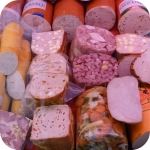
Processed Meat
Studies have found that men who regularly eat processed meat have a lower sperm count and up to 30% more abnormal misshaped sperm. Therefore, if you eat a lot of processed meats, it may take you a lot longer to get your partner pregnant and if you have other factors reducing the potency of your swimmers, you may be waiting a long time to become a father.
Processed meat is not fresh meat; something has been done to it to extend its shelf life or change its taste. These treatments include salting, curing, smoking and adding chemical preservatives.
Meats that should be cut down or avoided completely include: ham, bacon, salami, pepperoni, hot dogs, spam, bologna, chorizo, pastrami, corned beef, pâté, sausages, burgers, chicken nuggets and most ready meals.
Fresh meat is safe and this includes minced meats, as mincing is not the same as processing. If in doubt about a meat, look for extra ingredients on the packaging of the meat as these will tell you if it has been processed to last longer.
Given that processed meat is also linked to a greatly increased chance of developing heart disease and cancer, you may want to think about cutting down on it even when you are not trying for a baby.

Full-Fat Milk
Whole milk can affect a man’s fertility in a couple of ways depending on how the farmers treat their dairy cattle and the farmland they graze upon:
• Some milks, particularly from modern dairy farming techniques, contain high levels of oestrogen and other hormones. While these are intentionally added to the cattle’s feed to boost production, in high quantities they can reduce the sperm count
• Pesticides and chemicals in the environment, from certain crop farming techniques, can find their way into the cattle’s feed and once digested, bind to dairy fat causing a reduction in sperm motility
The good news is that you don’t have to give up milk entirely; cut back on how much milk you have and use skimmed or low-fat milk instead of semi or full-fat. Alternatively, you can use almond milk as a healthy nutritious alternative (though as mentioned above, don’t use soy milk as it contains high levels of isoflavones).
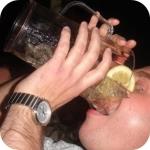
Alcohol
Unsurprisingly there have been a lot of studies into alcohol’s effect on a man’s fertility and they all say that heavy drinking lowers testosterone, reduces sperm count and increases the number of misshaped sperm. Add to that, high alcohol consumption increases your chances of erectile dysfunction, and you’ll really want to cut down on your booze if you want to father a child.
There is good news however; moderate drinking is considered to be safe for men while trying for a baby (there are even some studies that say male fertility goes up with moderate drinking). If you stick within the government guidelines for alcohol consumption you should be okay (in the UK this is 14 units or less a week, which is the equivalent of six pints of average strength beer or seven glasses of wine per week). But before you ask the question; no you cannot save up all your units for one night each week. Binge drinking can put major strain on all your organs for days, disrupting sperm production while your body deals with the effects.
If you are going to drink while trying for a baby, try drinking alcohol that is high in antioxidants which are good for fertility, such as red wine or Guinness.

Caffeine
Studies on caffeine consumption conflict, with some saying it is bad, while others claiming it is good for you. What everyone agrees is that excessive caffeine is bad for you regardless of whether you are trying for a baby or not. So why take the risk of it affecting your fertility and reduce your daily intake. Not only will you increase the quality of your sperm if caffeine is bad for them, but you will also be more healthy generally.
But what is a healthy amount of caffeine? Well, it is generally agreed that 400mg of caffeine can be consumed daily without any adverse effects. Depending on blend and brand, this roughly translates out to a maximum of one of the following (but not all together):
- 4 cups of coffee per day
- 6 cups of tea per day
- 8 cans of coke per day
- 2 energy drinks per day
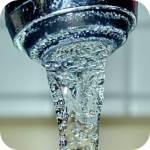
Tap Water
When discussing foods to avoid when trying to conceive, you wouldn’t normally expect to see water, not really being a food and all. However, tap water may reduce the number of sperm you are producing thanks to high levels of oestrogens in some water sources (a hormone which is known to have a detrimental effect on sperm production in high quantities).
Oestrogen levels in tap water have been increasing ever since women started taking the contraceptive pill as a method of birth control. This is because sewage treatment of water is very inefficient at removing the hormone from urine and so it gets recycled back into the water system.
Of course, the levels of oestrogen in your tap water depends on where you live. For example, there is a saying that London tap water has been through seven other people before you drink it. Now I don’t know if that is true, but living in or near a major city is much more likely to make your tap water contaminated with oestrogen than if you live in a rural area.
So what can you do about it? Well you can’t cut out water from your diet and drinking two or more litres of the stuff a day is recommended to keep you healthy (which is good for your fertility).
You could drink bottled water instead, which will limit your oestrogen intake. However bottled water can prove expensive when that is your only source of water (and depending on where in the world you live, you may have to worry about xenoestrogens in the plastic).
Another alternative is carbon water filters. These claim to reduce the amount of oestrogen in tap water. As a bonus, with filters you wouldn’t have to lug heavy containers back home from the supermarket every couple of days.
Links to Popular Related Pages


